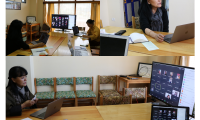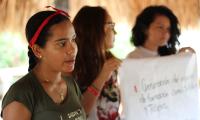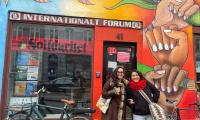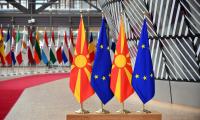Digital communication in times of corona can strengthen political networks
While the pandemic has created difficult conditions for many of DIPD's partners around the world, new opportunities have also emerged in its wake. In Bhutan, digital meetings help a network of women in politics intensify their reach and engagement

BNEW networking digitally
- On one hand we found it extremely challenging and frustrating to not be able to implement some of our activities as planned because of lockdowns and travel restrictions. On the other hand, since we had to learn to cope and adapt to the new realities, we found that digital modes of communicating with our members had some advantages and positive sides too – insofar as internet connectivity and network reception allowed us to meet, which is not always the case in Bhutan.
Phuntshok Chhoden looks back on a year, which brought radically new working conditions to her organization, as it did for countless others around the world. She is head of the Bhutan Network for Empowering Women (BNEW) in Bhutan, which holds over 4000 members from all over the country. And while it was impossible for all members to meet on a regular basis, even before the pandemic, smaller meetings are crucial to the organization’s work, explains Phuntshok Chhoden:
- Most of our impactful work has been a result of working on the ground, meeting and interacting physically as often as we could. Before the pandemic, we held regular physical meetings, both quarterly board and steering group meetings, as well as an Annual General Meeting which brings together some 300+ members for 2-3 days, and various capacity building workshops at district and regional levels.
The Bhutan Network for Empowering Women (BNEW) is a non-partisan, apolitical networking organization, that works to promote, facilitate, and strengthen women’s participation and representation in politics and leadership, both at local and national level.
The organization has over 4000 members and a wide reach, touching all 205 “Geogs” (local governments) in the 20 “Dzongkhags” (districts) of Bhutan, in addition to women in political parties and members of Parliament.
Fortunately, BNEW also has a digital infrastructure in place among its members, which turned out to be of great use, when the pandemic made it impossible to meet physically. The organization has several subgroups on WeChat, which they use extensively to share information and stay in touch.
- We’ve always encouraged members to stay connected with us and amongst themselves via WeChat, which is a popular app in Bhutan. This is mainly due to its audio messaging feature, since most of our members are more functionally literate and hence enjoy the ease of voice messaging in the absence of face-to-face meetings, says Phuntshok Chhoden.
Digital communities
The familiarity with WeChat turned out to be an advantage, when BNEW staff and members made the transition to online meetings via Zoom during the pandemic. It was also a great help to receive online training from DIPD staff on how to use Zoom more effectively. Digital meetings have their limitations, but the new platforms provided some new opportunities:
- Meeting digitally increased the frequency of our meetings, as my team members took the initiative to talk to smaller groups more often, given that not everyone could be available at same time due to work or connectivity issues. And as it became impossible to send professionals out to follow our members, we coached and got many of them to make short videos and share with us to help our documentation of stories on them, says Phuntshok Chhoden.
BNEW has also used the digital platforms to engage a large group of women, whom they hope to recruit for the upcoming local government elections:
- We have a particular group of women currently engaged as non-formal education instructors across the country, whom we are targeting as a pool of potential candidates for the upcoming 3rd local elections. For them, we were able to organize a round of familiarization meetings via Zoom, which was very useful in terms of engagement. When the situation improves, we plan to organize proper workshops with this group across the country as part of our efforts to mobilize more women candidates . All our members are eagerly looking forward to the face-to-face meetings.

Although the organization’s 2020 Annual General Meeting had to be cancelled due to the pandemic, BNEW managed instead to organize a series of four smaller meetings in the latter part of the year when travel restrictions were slightly eased, bringing together a total of 375 women from all 20 districts of Bhutan. Other meetings have had to be postponed, explains Phuntshok Chhoden:
- A very important training workshop with more than 50 parliamentarians had to be postponed and rescheduled a few times – and we hope to be able to carry out the workshop once the on-going lockdown is over and the virus is finally brought under control with vaccinations.
New form of engagement
DIPD director Lisbeth Pilegaard was to be among the participants of the originally planned BNEW Annual General Meeting, but like Phuntshok Chhoden, she has been confined to her home country this past year. In the DIPD secretariat in Copenhagen, working conditions have also changed dramatically:
- Our work consists of meeting and talking to people, facilitating meetings, creating platforms for dialogue, and building mutual bonds of trust and cooperation. All this is often done best with physical meetings, so it has been challenging to not be able to travel and meet with our partners, says Lisbeth Pilegaard.

However, as in Bhutan, the crisis also brought new opportunities to DIPD. It has been easier for the Danish political parties and the DIPD secretariat to get in touch with partners all over the world – even leaders and VIPs, who were busy with travels and meetings a year ago. And from the partners, Lisbeth Pilegaard has heard similar stories to that in Bhutan:
- Several partners around the world have actually blossomed in the crisis and strengthened their communication with the members. They may have had difficulties meeting physically before the pandemic, or they might not always have had the means to go or even be invited to the big events in the capital – but now they can log on to their smartphone and communicate much easier with the party and their base. So, despite all the difficulties this pandemic has brought, it has also shown us new ways of engaging people



